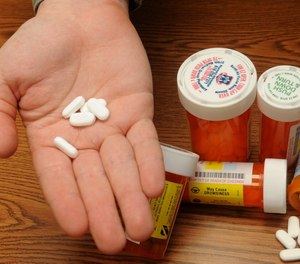
The county will use one of two grants to allow for a team of four peer recovery specialists to ride with EMS personnel during drug overdose calls
By Erika Butler
The Aegis, Bel Air, Md.
HARFORD COUNTY, Md. — One of the four grants Harford County has received this year will have on-call peer recovery specialists riding along with emergency responders on drug overdose calls.
The grants, totaling more than $463,000, were announced last week by Maryland’s Opioid Operational Command Center as part of $10 million in grants awarded across the state.
“They are significant for Harford County because they are new funds for the [Barry] Glassman administration to fight the opioid epidemic and support recovery, which has been a major initiative of the county executive,” Cindy Mumby, a spokesperson for Harford County government.
One of two grants applied for by Harford County government was for $126,000 to allow for a team of four peer recovery specialists, organized by a coordinator, to be on call 24 hours a day, seven days a week to ride with emergency medical responders who are called for an overdose, Mumby said.
“It will put a recovery coach, someone who has been there, on the scene when there is an overdose, to have the most immediate impact,” she said. “The effort is intended to bring a peer recovery counselor right to folks who need them at the most important time.”
Harford has 120 trained volunteer peer recovery specialists, she said, but having them ride with EMS is a new program. The county hopes to have the specialists responding to calls by late October, she said.
“It’s an innovative program we’re not aware has been done anywhere else in Maryland,” Mumby said.
The second grant obtained by Harford County government for $59,000 is through a partnership with Harford County Public Schools to address needs of high-risk families, Mumby said.
“We look at kids ages 6 to 12, in families with a history of substance abuse or at a high risk of substance abuse," she said.
Two 14-week training sessions — with 15 families in each — will be scheduled in the spring at different locations to focus on parenting skills and improving communication, the importance of doing homework and avoiding substance abuse, Mumby said. It will also discuss conflict resolution — talking things out rather than taking physical action.
The benefits of such training tend to stick, Mumby said, citing one study that indicated that in one year, binge drinking by eighth-graders in the program decreased by 50%.
The Harford County Health Department obtained a grant that will allow Addiction Connections Resource to strive to meet the demands of those seeking treatment, Ronya Nassar, a spokesperson for the health department, said.
ACR received $108,506 to aid recovery housing and support services in Harford County. The project will also assist with a team of peer recovery specialists that will reach out to their clients for the next year to check on their welfare and assist them with their recovery.
Through a fourth grant, Harford’s Opioid Intervention Team will receive $169,552 to support a central intake, navigation and recovery team to enhance early identification and interaction for those with substance use disorder.
“Our administration continues to be committed to using every resource possible to ensure our local jurisdictions have access to life-saving resources such as programs aimed towards prevention, treatment, and recovery,” Gov. Larry Hogan said in a news release. “These grants are a powerful tool for our local communities in our fight against the opioid epidemic.”
Harford has been leading the fight against heroin and other opioid use for the last several years, with efforts that include signs in front of the Harford County Sheriff’s Office with a running tally of overdoses and death, which as of Tuesday stood at 274 opioid overdoses, 35 of which have been fatal, for this year.
Upper Chesapeake Health, in partnership with Harford County Government, opened the Klein Family Harford Crisis Center in June, which began 24-hour-a-day, seven-day-a-week operations Aug. 19.
———
©2019 The Aegis (Bel Air, Md.)
McClatchy-Tribune News Service
Copyright © 2024 EmsGrantsHelp.com. All rights reserved.
